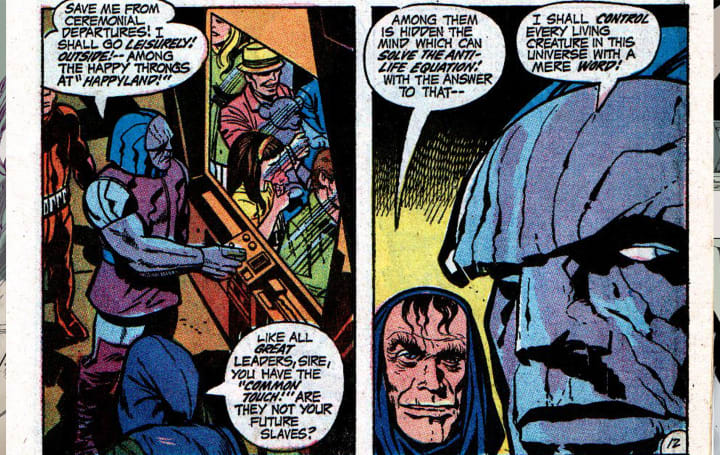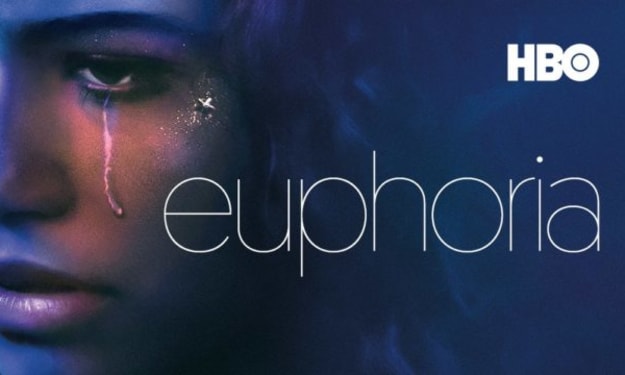The Terror and Allure of Jack Kirby's Darkseid
Exploring oppression, faith and politics through the king of comics' greatest villain

For the early decades of the American comic book industry, its character motivations were simple. There was good and there was evil, and evil would always be vanquished by good in the end. And while the nature of both good and evil would be explored with some characters through the silver age, it was with the creation of the New God Darkseid from Jack Kirby's line of the 'Fourth World' at DC that the king of comics would highlight a different kind of evil that transcended these concepts.
Jack Kirby, a veteran of WW2, was notorious for his distaste of Nazi's and the fascist ideology as a whole, creating the famed nazi-smasher 'Captain America' with Joe Simon during a time when America was not even yet at war with Germany, gaining the ire of the American Nazi party in the process. After his military service, he returned to comics at what would become Marvel comics, where he co-created classic titles like 'The Fantastic Four', 'The Incredible Hulk' and 'The Mighty Thor'. It was in the latter that the seeds of an idea, a brand new mythology, began to grow. Ideas he originally pitched as a follow-up to 'Thor' where the gods of Asgard, left dead after the twilight of the gods Ragnarok, would be replaced with a race of new gods in their place. Since Marvel wasn't too keen on throwing out such a massive mythos and catalogue of characters, they rejected the pitch. Upon jumping ship to rival DC comics, Kirby took these ideas and set out to create his mega-epic, 'the Fourth World', which would blend classical mythology and operatic drama with gripping science fiction, the hippy movement and real-world archetypes.
The setting seems basic upon first glance. Two worlds ruled by powerful beings known as the New Gods are at war. One good, New Genesis, where freedom and individuality is nurtured, and one evil, the aptly named Apokalips, where death and conflict are revered and liberty is seen as false. While there were many characters spread out over several titles ('Superman's Pal Jimmy Olsen',' Mr. Miracle', 'the New Gods' and 'the Forever People'), each of them representing a specific aspect of our own society, one of these stood out over all the rest; the supreme ruler of Apokalips: Darkseid.

In the narrative, the god Darkseid gained power over the world of Apokalips through deception and murder, eventually achieving access to the power of the Omega Force, which granted him the ability to kill and revive any living being. He has obtained de-facto godhood, and is revered as such by his people, who practically have turned Apokalips into a literal church in his honor. He is surrounded by a slew of extravagant followers, many representing real-world agencies that Kirby no doubt recognized as popular tools for oppressive regimes to control the masses (DeSaad being the incarnation of torture tactics, Glorious Godfrey representing propaganda, Granny Goodness as a twisted child services, Virman Vundabarr as the military and so on), who would all gladly die for him or sent out others to do so (“Die for Darkseid” is a oft repeated phrase among his entourage). Yet any such sacrifice is meaningless to the terrible ruler of Apokalips. Aside from the destruction of New Genesis, his ultimate goal is to obtain the mythical 'anti-life equation', which would grant him complete control over life and death itself. This would truly render all that wasn't Darkseid null and void, leaving only one terrible God in its place. Narcissism at its finest, drawn from a well of real life atrocities and populist rulers.
Jack Kirby experienced the dangers of totalitarianism and fascism firsthand, being a jew in a time millions where persecuted and killed by the oppressive Nazi regime. His hatred for Nazi's is well documented, and it appears he has channeled that disdain and his perception of tyrants directly onto his character. But Kirby knew from experience that tyrants are often not hated by their people, but revered to an almost religious degree. He realized the power that dictators wield with their words, promising greatness for all their subjects, while quietly using their devotion to further their own selfish ends. To highlight this to his audience, Kirby stripped Darkseid of those features and portrayed him as being completely open about his self-serving nature. To Darkseid, nothing matters that is not Darkseid. And yet his people still follow and worship him, even in the face of total suppression, a jackboot stomping out any form of joy on this terrible world.

Later writer and Kirby enthusiast Grant Morrison would write the Justice League of America storyline 'Rock of Ages', contributing the now famous quote “Darkseid is”. This one line summed up both Darkseid and the very idea of totalitarianism up perfectly. To the tyrant and the people he subjugates, there is nothing but Darkseid. Where real world dictators would blame minorities or spew contrived conspiracies to mask their real intentions and aspirations for self gain, Darkseid makes no such attempts. Anything that does not further his goals is pointless. Everyone is disposable. Everyone is a tool to be ground down as fodder for his war machine, or as an agent to spread his word and ideology until their purpose has been served.
Despite the fatalist rhetoric that Darkseid embodies, Kirby was no pessimist and believed that good would ultimately triumph over evil, as is evident by both the characters Mister Miracle and Orion. The former, a child of New Genesis raised on the hellish Apokalips, who would not only escape it but also free Apokaliptic native Big Barda and marry her. The later, the son of Darkseid, raised on New Genesis and able to take its values as his own, including feeling remorse for his violent actions. While a nature vs. nurture idea comes into play, with these foils to the evil overlord Kirby shows that Darkseid's totalitarianism is, while tempting and effective, ultimately doomed for failure. Good wins not through force, but as an ideal to uphold.

Sadly, Kirby's final plans for Darkseid never truly came to fruition, as the entire line of Fourth World books were cancelled before their storylines could be concluded. Along with the other New Gods, Darkseid was integrated into the main DC line, his role often relegated to a simple evil-overlord archetype, with most of his goals rendered more to maintaining status quo on Apokalips or (in the animated 'Super Powers Show') marry Wonder Woman. This was simply a side effect of a character living in a universe where the stories are never meant to end. The grand defeat and fall of evil was never to be, even with several attempts to give the lord of Apokalips a final death. P ure, egocentric evil always returned time and again. Perhaps, and sadly, that is the most realistic element of all.
A prime example of Darkseid's real power comes from the final episode of the 1990's animated series 'Superman'. After a heated and viscous battle, Superman gains the upper hand and does what had been considered impossible; he had beaten Darkseid. He throws the tyrant from his castle at the feet of a crowd of lowlies, the absolute bottom of the Apokalips' hierarchy, and tells them to do with him as they please. They are free. Then, rather than take up this freedom, they clamor around the wounded Darkseid and promise to nurse him back to health. A confused Superman looks on, while Darkseid laughs and says: “I am many things, Kal-El. But here, I am God.” Ultimate power over his subjects, enforced by a cult of personality alone.

In recent years interest in the original themes of Jack Kirby's Fourth world have sparked again, being prominently explored by writer Tom King and artist Mitch Gerads in the excellent 'Mister Miracle' mini-series, which takes a more critical perspective at New Genesis, blurring the lines between good and evil even further. Yet the shadow of Darkseid looms over the series. Whispers from in the dark, warning us once again of the dangers of fascism and the allure of populist thinking, summed up in a single phrase:
“Darkseid is.”
About the Creator
Joachim Heijndermans
Joachim is a freelance artist and writer. He writes short stories and draws comics. Likes to travel, paint, collect rare toys, and read in his spare time. His fiction writing has been featured in magazines, websites, podcasts and television






Comments
There are no comments for this story
Be the first to respond and start the conversation.